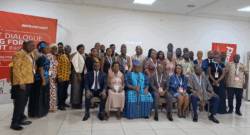One great song that is currently trending on social media and radio is titled ‘Everything you put your hand’, composed and sang by Timi Dakolo – a Nigerian musician. The song presents a blend of religious, social and economic significance. In fact, the philosophy and lyrics of the song will make any lover of African music repeatedly listen to it. Since the song hit the airwaves a few months ago, I have been inspired by its philosophy of hope for a brighter future.
The song begins with: “Everything you lay your hands go work, yourself go be a boss; if you believe it say Amen, Amen. Long life go follow you, strangers go follow you; one day, you can sign your cheque, your business go prosper, your name go open doors, you-self can be a boss; If you believe it say Amen, Amen, Amen. Good news go locate you, long life go follow, great men go follow you, your name no go end in shame. If you believe it say Amen, Amen, Amen”.
Much as the song at first hand is meant for entertainment and for religious edification, it speaks to the current economic issue in Ghana: that is, providing the needed enabling environment for the youth to become successful entrepreneurs. Perhaps the song was released to sync with the time youth unemployment has become a big issue in Ghana. According to Trading Economics Global Macro Models and Analysts, unemployment in Ghana is expected to reach 4.60 percent by the end of 2021. In the long-term, the unemployment rate is projected to trend around 4.40 percent in 2022 and 4.20 percent in 2023. Without doubt, the forecasts will make unemployment a crucial election issue in 2024.
The 2019 CDD Afrobarometer survey captured unemployment and education as the most important problems young Ghanaians want government to address. The report noted that unemployment has consistently ranked number-one among priorities of the youth, with education consistently at second or third position in past surveys. Job creation and education are also citizens’ top priorities for additional government investment in youth development.
The Afrombarometer report noted that unemployment, political and social exclusion have been cited as the key means of manipulating the youth and making them more vulnerable. Manipulation is often done by politicians through propaganda and inciting the youth to take to violence. Successive governments have tried to address needs of the youth through various social interventions aimed at skills training and job creation, but with different levels of success. Rising unemployment has apparently compelled the current government to start thinking outside the box.
Payroll is full
Last week, the Minister of Finance, Mr. Ken Ofori Attah, stirred muddy waters when he suggested that fresh graduates from the University of Professional Studies-Accra (UPSA) should consider starting their own businesses. Mr. Ofori Attah’s suggestion was based on the fact that the public sector has reached a point where it can no longer absorb university graduates.
In an address to students of UPSA, the Finance Minister noted that the only strategy to reduce the country’s high unemployment rate is to provide an enabling environment for youth to create their own enterprises. He said boosting youth entrepreneurship is the surest way to reduce over-reliance on public sector jobs and the burden on government’s payroll. Mr. Ofori-Atta disclosed that 60% of Ghana’s revenue is spent every month on the payment of salaries of public sector workers.
“That payroll is full because we are spending some 60% of our revenue on remunerating some 650,000 people. That is not sustainable.” The Finance Minister’s admonition seems to resonate with the philosophy of the Timi Dakolo song I analysed earlier.
The fact that the public sector over time will not be able to absorb a chunk of university graduates is not a secret. Past politicians have failed to speak the truth since 1957. The solution was for past governments to develop the private sector to become the true engine of growth. In the 1980s and 1990s, if the private sector had been enabled to lead economic development, unemployment would not be a big issue today. Sadly, in the past government policy targetted and destroyed the private sector because entrepreneurs were perceived as enemies and dissidents by government.
Cost of doing business
Refreshingly, the Finance Minister challenged the fresh students to obtain the requisite skill-sets to become successful entrepreneurs. “Our responsibility as a government is to create the environment and macro stability, currency stability and ensure that you have access to the relevant skills and financing.” The Finance Minister further explained that entrepreneurship requires skill-sets and credit for the youth to launch their entrepreneurship visions. However, government needs to address the issue of interest rates if it is to provide the enabling environment for youth entrepreneurship.
Comparatively, credit is too costly in Ghana with regard to interest rates. At an average of 30 percent, interest rates are too high for the kind of start-up enterprises the Finance Minister envisages for the youth. It is also a fact that many of the banks, especially the so-called development banks, are risk averse and aren’t supporting agriculture as they ought to. I only hope government will structure its budget, as the Finance Minister promised, to focus on supporting the youth to create their own jobs.
Ghana cares programme
On paper, the Ghana CARES programme promises to redefine entrepreneurship as part of the COVID-19-adjusted economic resuscitation. It is only to be hoped that the 2022 budget will really focus on enterprises. “This budget that we are going to be doing is going to really focus on the youth. We will have a programme in it looking at the youth and [their] demands and how we can structure… the Ghana Obaatanpa Programme [for the next two or three years] to ensure that the youth become their own bosses, and how to become entrepreneurs,” the minister assured.
The Ghana CARES (Obaatan pa) programme is a GHȻ100billion COVID-era programme to stabilise, revitalise and transform Ghana’s economy. Its target is to create jobs and prosperity for Ghanaians over a three-year period. It is sequenced in two phases: A Stabilisation Phase that runs from July to end of the year (2020); and a medium-term Revitalisation Phase from 2021-2023.
The second phase aims at revitalising and transforming the economy from 2021-2023, and will focus on: supporting commercial farming and attracting educated youth into agriculture; building Ghana’s light manufacturing sector; developing engineering/machine tools; and ICT/digital economy. These are areas the youth can easily establish themselves in, but – as indicated earlier – the cost of starting business is still high. The start-up capital aside, the cost of office accommodation and land is a disincentive to future young entrepreneurs.
Looking forward
A 2020 World Bank report titled, ‘Youth Employment Programmes in Ghana: Options for Effective Policy Making and Implementation’ identifies agribusiness, entrepreneurship, apprenticeship, construction, tourism and sports as key sectors which can offer increased employment opportunities for Ghanaian youth. The report also calls for more investments in career guidance and counselling, work-based learning, coaching and mentoring to equip young people with the skills needed for work. The report suggests that although these are not new areas, government could maximise their impact by scaling-up these priority areas in existing youth employment interventions and improving outreach to the youth.
“This report is another milestone toward addressing the unemployment challenge,” said Ignatius Baffour Awuah, Ghana’s Minister of Employment and Labour Relations. “It presents specific options to guide government in the short- to medium-term to enhance effective coordination of youth employment programmes.”
To tackle youth unemployment, the report highlights the importance of having disaggregated data on youth jobseekers by location, gender, skills and capabilities to inform policy and funding decisions, and respond with appropriate and tailored employment programmes.
“Ghana’s youth employment challenge is vast and requires an all-round, deliberate and consistent response,” said Pierre Frank Laporte, World Bank Country Director for Ghana, Liberia and Sierra Leone. “Considering the options outlined in this report, future youth employment policy planning should not only address youth unemployment but also build the human capital needed to sustain Ghana’s economy.”
The authors lay out key priorities to promote youth employment in Ghana:
- Importance to align formal education programmes and skills development initiatives in the context of a fast-changing labour market that requires new and different skill sets, and to adapt to new technology.
- Partner with the private sector – such as involving employers in the design of training curricula and introducing certifications for occupational standards in order to adapt to the future of work.
- Integrate pre-employment support activities as part of the country’s current education system to better prepare young people for the transition to work.
- Promote social inclusion initiatives to improve access to credit and management training for women entrepreneurs, as well as improve both infrastructure and equipment available for persons living with disabilities and ensure that no one is left behind.
In addition, the report emphasises the need for greater collaboration among different stakeholders to reduce duplication and fragmentation of youth employment programming.
Entrepreneurship is important for several reasons, from promoting social change to driving innovation. In many developed and emerging economies, such as Malaysia, Thailand, South Korea, Brazil etc., entrepreneurs are being upheld as national assets and motivated to the greatest possible extent.
In fact, some of the most developed nations – such as the United States, Great Britain, France, Germany, Canada, Italy etc. – are world leaders due to their forward-thinking innovation, research and the power of their individual entrepreneurs. Many of America’s global corporations started as small family enterprises.
There is nothing more fulfilling than being your own boss. So, rather than being antagonistic toward the Finance Minister’s policy-suggestion, the youth of Ghana must embrace the new spirit of entrepreneurship. As the musician Timi Dakolo assured us in his song, ‘Everything you put your hands go work, you-self go be your boss; if you believe it, say Amen, Amen, Amen.










